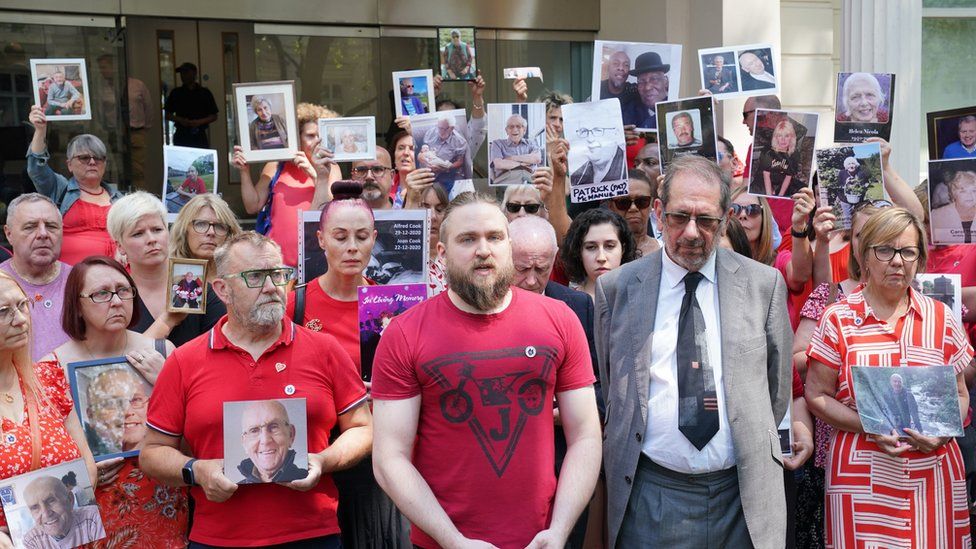ARTICLE AD BOX
 Image source, PA Media
Image source, PA Media
Matt Fowler (centre), co-founder of Covid Bereaved Families
Matthew Fowler, who lost his father Ian to Covid in April 2020, has told the Covid Inquiry that he has received abuse online after speaking about the virus.
He is co-founder of Covid-19 Bereaved Families for Justice, which campaigns to learn lessons from the pandemic.
Mr Fowler spoke of how people from his organisation have been "stalked via social media".
He added that others had been "threatened".
Tuesday marks the final day of witnesses giving evidence to the first part of the inquiry, which has focused on resilience and preparedness.
It has been hearing from groups representing bereaved families across the four UK nations.
What is the UK Covid-19 inquiry?
- It is about going through what happened and learning lessons
- No-one will be found guilty or innocent
- Any recommendations made do not have to be adopted by governments
- The inquiry has no formal deadline but is due to hold public hearings until 2026
- Scotland is holding a separate inquiry in addition to the wider UK one
Mr Fowler's father, Ian, first developed symptoms of Covid in late March 2020 and was taken into hospital, where he tested positive and had to be intubated.
Ian died on the 13 April, with Mr Fowler explaining how restrictions meant his father had to be cremated in his hospital gown: "It's not dignified for someone making their final journey."
Mr Fowler, who appeared as England's representative, spoke of "Covid denial or scepticism" and said: "Anti-mask protesters, vaccine sceptics, those people have often targeted me and members of the group that I represent.
"Sometimes they have gone out of the way to seek people out."
He emphasised that people who had lost loved ones to Covid were treated differently, and often questioned.
"Had my dad died from something else, say cancer, people wouldn't be coming to me and saying 'well, was it really cancer?'.
"It's something that has been very unique to our loss to be targeted in that way."
Inquiry chairwoman Baroness Heather Hallett responded by saying such abuse was "plain cruel".
"Your father was obviously a very special man and his death a great loss to you, your family and - by the sounds of it - the local community," she said.
"So you've done him honour in the work that you've done. And I promise I will answer as many of the questions and learn any lessons that I can in the course of this inquiry."
The inquiry also heard from Jane Morrison, who represents Scottish Covid Bereaved.
Image source, PA Media
Image caption,Jane Morrison (right) with her wife Jacky Morrison-Hart who died in October 2020
She lost her wife Jacky in 2020, five days after she caught Covid in hospital.
Ms Morrison began her evidence by thanking key workers, who took that "extra, often small, compassionate step".
"It's a moment of kindness in a dark world," she added.
There is currently a separate Scottish Covid-19 Inquiry going on, but it is yet to hold any public hearings.
Ms Morrison said one of the main concerns for her organisation was infection control in hospitals - describing it as "close to my heart". She also said the handling of funerals by government officials was traumatic.
She went into hospital to say goodbye to her wife - but then had to immediately isolate after her death.
"If someone had been with a loved one at the end, they had a choice," she said. "You can either come in and be with them at the end or you can go to the funeral. But you can't do both, because you need to be in isolation."
Anna-Louise Marsh-Rees also gave evidence, as leader of Covid-19 Bereaved Families for Justice Cymru.
She said her father Ian died aged 85, after catching the virus in hospital - he had originally been admitted in October 2020 for gallbladder problems.
The health board told her 13 patients on Mr Marsh-Rees's ward tested positive during his time there, as well as 14 members of staff.
Ms Marsh-Rees said it was "awful" to watch her father, who had been shielding at home for months to protect himself, "die gasping for breath". She added that many members of her group are "haunted" by the idea of going to hospitals and no longer feel they are a safe place.
"People used to say they're in the right place when they go to hospital. I'm not sure if they would say that any more."
The last person to give evidence to the inquiry was Brenda Doherty, whose mother Ruth Burke was the first woman to die in Northern Ireland with Covid, at the age of 82.
Brenda Doherty: 'My mummy was not cannon fodder'
Ms Doherty says she has many regrets, including not being able to kiss her mother one last time, or being able to bury her in her favourite red dress.
Her mother died in March 2020 after being admitted to hospital after a routine X-Ray appointment.
"I had been very vocal about mum's death and that she wouldn't become a statistic," she said. "Everybody will know who she was, the life she had and not just how she died."
Related Internet Links
The BBC is not responsible for the content of external sites.

 1 year ago
50
1 year ago
50








 English (US) ·
English (US) ·